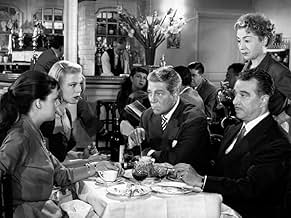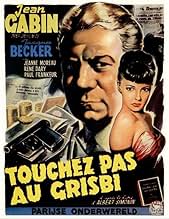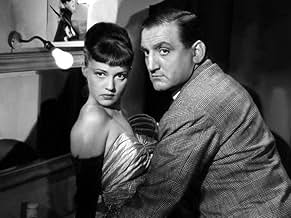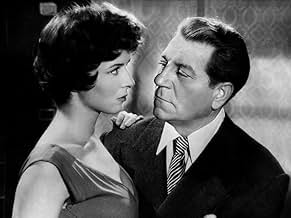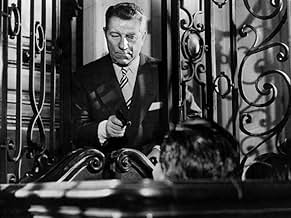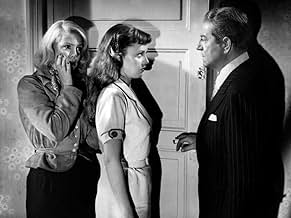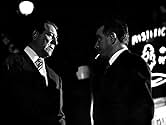ÉVALUATION IMDb
7,7/10
9,3 k
MA NOTE
Ajouter une intrigue dans votre langueAn aging, world-weary gangster is double-crossed and forced out of retirement when his best friend is kidnapped and their stash of eight stolen gold bars demanded as ransom.An aging, world-weary gangster is double-crossed and forced out of retirement when his best friend is kidnapped and their stash of eight stolen gold bars demanded as ransom.An aging, world-weary gangster is double-crossed and forced out of retirement when his best friend is kidnapped and their stash of eight stolen gold bars demanded as ransom.
- Prix
- 1 victoire et 1 nomination au total
Marilyn Buferd
- Betty
- (as Marilyn Bufferd)
Paul Barge
- Eugène
- (as Barge)
Alain Bouvette
- Le chauffeur de taxi
- (as Bouvette)
Avis en vedette
This masterpiece of French noir exemplifies the depth of friendship and honor between thieves in this classic. The protagonist and his partner could not be more different, but through the years they have developed a friendship beyond mere love, a friendship cemented in the trenches of criminal warfare and not to be trifled with. The plot's treachery is utilized to effect as the polar opposite of this eternal bond, a bond which is best elucidated with some of the more mundane aspects of life. This bond is also compared with the superficial love between the sexes, where men love their woman only during the act of love. The acting was sublime, with heavies Jean Gabin, Lino Ventura, as well as some mightily proportioned women to grace the eyes. The direction and camera work were wonderful, and the score was the perfect compliment to the darker side of life. Genruk' Evil Eye Reviews
Jacques Becker 1954 "Touchez pas au grisbi" is a delight to watch. M. Becker was an artist that knew what to give his fans, as he clearly shows in this masterful account about the gangsters operating in Paris during the fifties. Becker and his cinematographer, Pierre Montazel, brought the cameras to the streets as we are taken to savor that underworld they operated from. The jazzy score by Jean Wiener works well in the film. The film shows us the bygone Paris of that period, beautifully photographed by M. Montazel in all its splendor.
At the center of it all is Max, the older gangster who suddenly begins feeling the toll of his years living dangerously and is contemplating retirement after he, and his partner, Riton, get rid of the gold bars they have stolen from a shipment at Orly airport. Max and Riton are seen at the beginning of the film dining at Chez Bouche with two younger women, Josy and Lola, who are chorus girls in the night club that seems to be the venue where these characters like to frequent.
Things get complicated when Josie tells the newly arrived Angelo about what Max and Riton have and the trouble starts as he wants to get to the stolen goods for his own benefit. Thus begins a conflict between two different factions of the underground that will end badly. Max's plans for retirement with the proceeds of the sale of the stolen gold will have to wait.
The best thing about the film is the uncanny way M. Becker and his collaborators reproduce that era for us. The world of the night clubs, restaurants, watering places, apartments, and other places where these characters move, are faithfully recreated for our pleasure in the movie. This film noir influenced a lot of other movies that came after, as Becker's influence inspired future movie makers.
Jean Gabin, probably the best French actor of all times makes us like his Max, even though we realize he is a criminal. M. Gabin is the whole reason for taking a look at this film that he dominates at all times. Rene Dary, is seen as Max's partner in crime, Riton. Jeanne Moreau in one of her earlier films shows why she went to be one of the stars of the French cinema. Her Josie is excellent. Also in the cast, the fabulous Lino Ventura who plays Angelo. Denise Clair plays Mme. Bouche and Dora Doll is Lola.
"Touchez pas au grisbi" will not disappoint Becker's fans.
At the center of it all is Max, the older gangster who suddenly begins feeling the toll of his years living dangerously and is contemplating retirement after he, and his partner, Riton, get rid of the gold bars they have stolen from a shipment at Orly airport. Max and Riton are seen at the beginning of the film dining at Chez Bouche with two younger women, Josy and Lola, who are chorus girls in the night club that seems to be the venue where these characters like to frequent.
Things get complicated when Josie tells the newly arrived Angelo about what Max and Riton have and the trouble starts as he wants to get to the stolen goods for his own benefit. Thus begins a conflict between two different factions of the underground that will end badly. Max's plans for retirement with the proceeds of the sale of the stolen gold will have to wait.
The best thing about the film is the uncanny way M. Becker and his collaborators reproduce that era for us. The world of the night clubs, restaurants, watering places, apartments, and other places where these characters move, are faithfully recreated for our pleasure in the movie. This film noir influenced a lot of other movies that came after, as Becker's influence inspired future movie makers.
Jean Gabin, probably the best French actor of all times makes us like his Max, even though we realize he is a criminal. M. Gabin is the whole reason for taking a look at this film that he dominates at all times. Rene Dary, is seen as Max's partner in crime, Riton. Jeanne Moreau in one of her earlier films shows why she went to be one of the stars of the French cinema. Her Josie is excellent. Also in the cast, the fabulous Lino Ventura who plays Angelo. Denise Clair plays Mme. Bouche and Dora Doll is Lola.
"Touchez pas au grisbi" will not disappoint Becker's fans.
Max and Riton are ageing gangsters who are trying to 'retire' after their latest big heist. Early on in a night club scene, Max intimates he would rather go home and sleep as he is tiring of night-clubbing and the late hours. Riton, his best and oldest friend, is trying to stay youthful, although unknown to him, he is getting cuckolded by a younger man right there at the club.
The bond between the friends is insoluble, even though they grouse inwardly about each other. If you ever had a lifetime friend, you will instantly connect with these two - you will just know the link. Anyway, without giving too much away, another crook wants to muscle in on their windfall with an undeserved split via the extortion route. That's all I can tell you, but get the DVD.
Max (played by the great Jean Gabin) has a secret pad, and to avoid trouble, invites Riton to stay overnight. These two are such old friends that, in a scene as humorous as it is tinged with melancholy, Max produces a pair of pajamas and a toothbrush for his old pal (remember sleepovers with a friend?).
The film takes a while to get underway, and all the action is toward the end of the picture, but you can overlook the pacing as it is an unforgettable homage to friendship and advancing age. Adding to the generational disconnect is the use of obsolete slang, as when Max calls someone 'Daddy-O' (Actually, it must have fit better in its initial release in 1954, but seems completely out-of-date now).
"Touchez Pas Au Grisbi" plays like a film noir/buddy picture and is thoroughly enjoyable and entertaining, Film buffs may recognize Jean Moreau as Riton's unfaithful girlfriend.
The bond between the friends is insoluble, even though they grouse inwardly about each other. If you ever had a lifetime friend, you will instantly connect with these two - you will just know the link. Anyway, without giving too much away, another crook wants to muscle in on their windfall with an undeserved split via the extortion route. That's all I can tell you, but get the DVD.
Max (played by the great Jean Gabin) has a secret pad, and to avoid trouble, invites Riton to stay overnight. These two are such old friends that, in a scene as humorous as it is tinged with melancholy, Max produces a pair of pajamas and a toothbrush for his old pal (remember sleepovers with a friend?).
The film takes a while to get underway, and all the action is toward the end of the picture, but you can overlook the pacing as it is an unforgettable homage to friendship and advancing age. Adding to the generational disconnect is the use of obsolete slang, as when Max calls someone 'Daddy-O' (Actually, it must have fit better in its initial release in 1954, but seems completely out-of-date now).
"Touchez Pas Au Grisbi" plays like a film noir/buddy picture and is thoroughly enjoyable and entertaining, Film buffs may recognize Jean Moreau as Riton's unfaithful girlfriend.
Max(Jean Gabin) is a gentleman gangster with a penchant for nice suits and champagne and the brains of the criminal partnership, the other being his long time friend and partner in crime, Riton (René Dary),"the muscle" so to speak of their partnership, together they have just pulled off a substantial heist and are now 50 million francs better off in gold bars. Max likes the easy life of night clubs and restaurants, he isn't greedy and now intends to retire with his fortune, Riton agrees, but he inadvertently tells his young night club dancer girlfriend Josy (Jeanne Moreau)of his large stash of Grisbi(Loot/Swag), she has been two timing him with the much younger and very ambitious crook Angelo, Josy of course informs him and using this knowledge Angelo sets out to take it from Max. Max suspicious that he is being followed confides in Riton that something is about to happen,he also tells his old friend how he discovered Josy's infidelity, Riton is furious and leaves Max's safe haven to take revenge on his younger adversary.Riton ends up in a trap and is kidnapped by Angelo, demanding Max release the gold as ransom. Touchez pas au grisbi isn't so much an action crime flic as it is a no action one, we never get to see the heist or the every day violence of the criminal fraternity, Becker's film is much more about the silences between the crimes and the everyday mundaneness of the criminals life, their conversations, their dining habits etc
this ploy is all the more effective when the film explodes at its climax with the type of violence you would expect of a typical Crime film. A forerunner of Dassin's Rififi or more obviously Melville's Bob Le Flambeur, Touchez pas au Grisbi is a fine film that some might find a little dull, but its romantic vision of Parisien criminal lives is still very intriguing and a welcome alternative to the stereotypical hoods of the genre. Gabin is nothing short of superb as the aging gangster, willing to give up his position and power for the easy life, his relationship with his loyal friend Riton is more like that of a married couple who are still friends after many years together but ultimately wonder why they ever got together, we are only given one glimpse of Max's rage towards his friend in a brief voice over, where Max lets fly at his companions stupidity, that might cost them both their lives and their Grisbi, other than that Max is a cool operator, nothing fazes him, even as the plot thickens and a quick response is required to save Riton's life, Max is just as easy going as he always is, he might just as easily be at home brushing his teeth or folding his pyjamas again, we never quite know what Max is thinking. The understated pate eating scene is superbly orchestrated by Becker ,there is hardly any dialogue but through gestures and eye movements, we learn an awful lot about their relationship
..Touchez pas au Grisbi in the hands of Becker is both elegant and evocative and a pleasure to behold and as French Noir goes its right up there with the best.
For fans of American gangster films, Jacque Becker's TOUCHEZ PAS AU GRISBI may seem like a radical departure from the violence and excess of films like THE GODFATHER and GOODFELLAS. It's a quiet film about quiet men, living out their golden years in a dignified manner. Much of the film is spent watching Max (Jean Gabin) as he dines with friends, cavorts with his mistresses and listens to his favorite tune on his old record player. The amazing thing about the film is that there's never any question that Max can be a dangerous man. There's a famous scene where Max and his long-time partner Riton (Rene Dary) eat pate, set up their sleeping quarters, dress in their pajamas and go to sleep without exchanging a word. There's an amazing, soft tension playing through this entire scene. Riton has screwed up a business deal, as he has done many times in the past, and Max is getting fed up. I was reminded throughout this scene of the famous line from GOODFELLAS about assassins coming as friends. This certainly would have been the right time for Max to whack Riton, if that were what he wanted. But he doesn't, because honor and loyalty are important aspects of Max's life, and he will protect his friend even though their big retirement job may be jeopardized. Max is, quite simply, the least Americanized gangster in film history, and he's a remarkable character. Jean Gabin solidifies his reputation as the greatest French film actor of all time through subtlety, nuance, and natural charisma. The film itself is painted with the rich black-and-white brush strokes of the best film noir, and truly succeeds in transporting the viewer to another place and time. A genuine, under-appreciated masterpiece.
Le saviez-vous
- AnecdotesFilm debut of Italian ex-wrestler Lino Ventura.
- GaffesWhen the submachine guns are removed from the wine box, they are Sten Submachine guns. When they are removed from the car after the ambush, they are Sten Guns. When they are finally shot at the retreating gangsters, they have become two different models of Thompson Submachine guns - an early civilian model of a Thompson and a military model (M1 or M1A1) of a Thompson.
- ConnexionsEdited into Histoire(s) du cinéma: Une vague nouvelle (1999)
Meilleurs choix
Connectez-vous pour évaluer et surveiller les recommandations personnalisées
- How long is Don't Touch the Loot?Propulsé par Alexa
Détails
- Date de sortie
- Pays d’origine
- Site officiel
- Langue
- Aussi connu sous le nom de
- Grisbi
- Lieux de tournage
- sociétés de production
- Consultez plus de crédits d'entreprise sur IMDbPro
Box-office
- Brut – États-Unis et Canada
- 131 548 $ US
- Fin de semaine d'ouverture – États-Unis et Canada
- 21 674 $ US
- 7 sept. 2003
- Brut – à l'échelle mondiale
- 131 548 $ US
- Durée
- 1h 36m(96 min)
- Couleur
- Rapport de forme
- 1.33 : 1
Contribuer à cette page
Suggérer une modification ou ajouter du contenu manquant

![Regarder Bande-annonce [OV]](https://m.media-amazon.com/images/M/MV5BMDdjNGE5Y2QtMDQ4My00M2Q3LTgwMGYtMjYxMzNlNmY1MTlhXkEyXkFqcGdeQXRyYW5zY29kZS13b3JrZmxvdw@@._V1_QL75_UX500_CR0)
